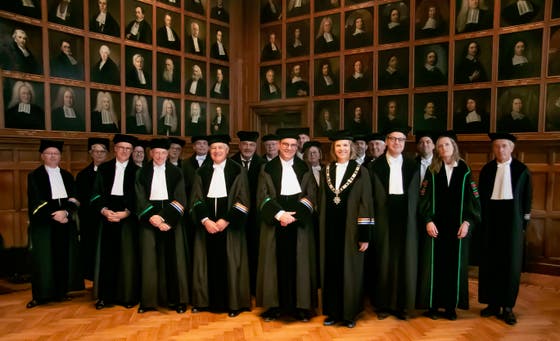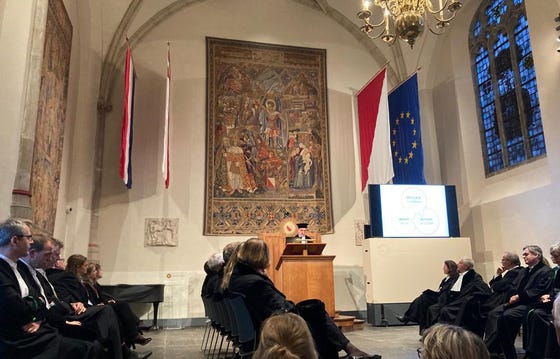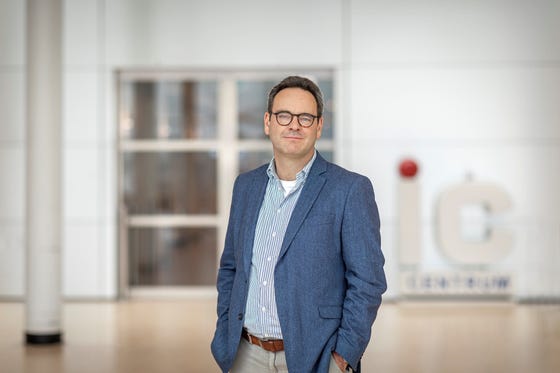Nov 8: Beyond Skepticism – inaugural lecture Olaf Cremer as professor of ‘Clinical epidemiology of sepsis’

On Friday, November 5, 2021, intensive care physician Prof. Dr. Olaf Cremer delivered his inaugural lecture on the occasion of his appointment as professor of 'Clinical epidemiology of sepsis' at UMC Utrecht. In his lecture, Cremer argued that the use of the term sepsis as a catch-all term is now doing more harm than benefit to progress in the research field and should therefore be avoided. In addition, scientific research into sepsis is patchy and too few replication studies are performed.
Sepsis develops when the immune response to an infection is so violent and uncontrolled that the body causes damage to its own tissues and organs. As a result, patients become life-threatening ill and often have to be treated in an intensive care unit (ICU). Each year, sepsis is responsible for about 20 percent of all deaths worldwide. COVID-19 is also a good example of how sepsis can sometimes go wrong. Fortunately, deaths from sepsis have fallen slightly in recent years. This is mainly due to improvements in the organization of care, which means that it is now recognized more quickly and can be responded to more adequately. But when it comes to specific treatments aimed at slowing down or adjusting the derailed immune response during sepsis, unfortunately, after more than 30 years of research, little progress has been made and no real breakthroughs in treatment have been made. In his inaugural lecture, Olaf Cremer examines why progress in the treatment of sepsis is slow and why trials so often end in disappointment.

Catch-all concept
The question quickly arises to what extent sepsis as a catch-all concept is actually still useful. According to Cremer, there are at least two problems that need to be recognized much more explicitly: “The current definition of sepsis leads to a hopeless entanglement of uncertainty about the diagnosis (presence of infection) and the prognosis (the development of organ dysfunction). We must separate these two aspects more strictly. Moreover, there are such large differences in patient characteristics, manifestations and time course that we cannot really speak of a single syndrome.”
“In addition, we have to recognize that there are many parallel pathways that lead to tissue and organ damage. At the same time, new drugs are usually designed to block only one specific molecule that is thought to play a central role in regulating the immune response. But to be effective, we will probably have to intervene in several places at the same time. However, this requires a smarter design of clinical studies, in which multiple interventions can be tested simultaneously and in their mutual relationship. One good example of such a smart study is the REMAP-CAP trial.”
According to Cremer, this heterogeneity has been recognized already for some time now and attempts to divide patients into more homogeneous subgroups have been going on for years. That is why building large cohorts specifically for this type of study is also very important. However, this requires long-term investments in resources and manpower, which have so far proved almost impossible.
“Sepsis is not a disease, not even a syndrome because there is no such thing as an archetypal sepsis patient. So it is really nothing more than a risk group.” He continues: “Although sepsis as an umbrella concept has served its purpose in putting the topic on the map and improving the healthcare system, the term is now more of a barrier. Using large-scale cohorts such as MARS and PLUTO, we expect to be able to better characterize patients in the future, but pending those results, I propose to stop using the term 'sepsis' in scientific research.”

Quality research
According to Cremer, another point of concern is that funding and resources are not used optimally within sepsis research, because researchers often want to take too large steps forward based on weak foundations. He therefore argues for a more skeptical attitude towards the scientific literature. Despite exploding numbers of publications on sepsis, replication studies are still scarce and the methodological quality of many studies remains mediocre. In order to achieve real breakthroughs, a change in the research culture will be necessary. As part of this, Cremer makes a plea for more attention to clinical epidemiology: “Many applications are awarded by grant providers are based on what the research promises to deliver, with an emphasis on innovative, high-risk/high gain, transformative, state-of-the-art projects. However, in my opinion, grant providers should pay more attention to the clinical-epidemiological underpinning and feasibility of a study proposal and should also set strict requirements for this. Within the UMC Utrecht we could also take steps in this direction by formally establishing which methodological quality requirements a study should meet, all the more so because such expertise is more than available in-house. Finally, there must be structural funding for replication research, so that impactful results can first be independently verified before follow-up steps are taken in the research.”
